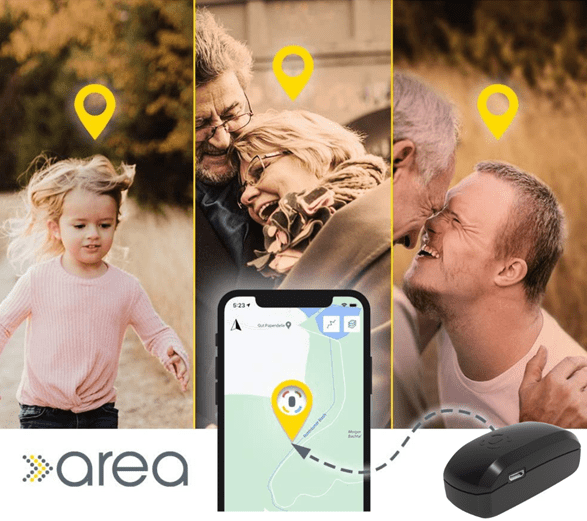With the progress of digitalisation, we can easily and quickly discover innovative GPS devices and systems that not only serve to clearly determine location, but can also contribute to the protection of human life. GPS tracking is becoming an increasingly relevant topic these days, which is why more and more tracking options can be found on the market. With just a click of the mouse, numerous offers of GPS trackers with impressive functions designed for individual needs appear. The new generation of highly efficient security and tracking systems offer many other possibilities and features besides positioning, like our area.
The GPS tracker area with its nurse and guard mode is designed to provide children, senior citizens and people with disabilities with quick and competent help in emergency and dangerous situations. They notify the user via the specially designed app if the device stops moving for a set period of time or if the user starts to move. In addition, it is possible to define the so-called geofence areas and to be notified when entering or leaving these areas. Thanks to its user-friendly functions, the location system area can play an important role in the safety of a family, especially if a valued family member has dementia at an advanced age.
The risk of dementia, such as Alzheimer’s disease, occurs in a large proportion of seniors. Dementia is most common in the age group over 90. Not only old age can be a risk factor for the disease, but also gender, hereditary disposition as well as lifestyle, e.g. smoking, obesity, alcohol consumption, neurological diseases, low mental activity and little social contact. The disease initially affects short-term memory and retentiveness. At a later point in the further development of dementia, the affected person loses parts of their long-term memory as well as essential abilities, thinking and speaking skills, behaviour as well as the perception of the outside world. The loss of orientation is also a serious risk factor, which can lead to dangerous situations among the sick.

The tendency to wander off: danger for dementia patients
Dementia can strike under different variations and not only causes harmful consequences in the brain, but also accelerates the thinking process. This can lead to illogical actions in those affected, such as spontaneously leaving the environment to reach a certain final destination. Running away occurs in people with dementia for various reasons and cannot be attributed to any clear intention. These “adventures” are not planned, but happen out of affect, when they are spontaneously overcome by the urge to do something, such as going to work or shopping. Some of those affected have no sense of time and live in the past. This often leads to spontaneous decisions, such as going home to visit a long-dead mother, father or partner. However, the problem of lack of orientation can also be observed in the tendency to run away. Affected persons often forget their final destination on the way. For example, they may find themselves in a supermarket and suddenly no longer know what they are looking for. In such cases, affected persons usually want to go straight home and often get lost due to their disorientation. To reduce the risk of running away, many people with dementia find it helpful to occupy themselves with varied games that are suitable for them. Everyday tasks such as cooking or setting the table can also have a positive influence on the sick.
The tendency to run away should not be underestimated in any case, as under various circumstances it can put the affected person in dangerous situations. In case of a longer absence, it is difficult to find out where the person is. In such cases, the GPS tracker area comes into play. It can pinpoint the exact location and, in an emergency, even save the owner’s life. The device is small, 38 grams light and is specially designed to give vulnerable people more freedom and prevent them from putting themselves in danger. It can be easily and securely attached to belts, bags or backpacks with the included cuff. In this way, the location of area can be determined to within a few metres using the Prothelis app. The “area” wayfinding system offers simple functionality and, thanks to its features, is especially suitable for people with dementia and disabilities.

What are the functions of the area tracking system for people with dementia?
· Guard Mode
As long as the tracker is in motion, you will be informed at regular intervals via push message. You will receive another push message as soon as area comes to a standstill again.
· Nurse Mode
If the tracker stops recording activity for a certain period of time, you will be informed via a push message. You will receive another push notification as soon as area starts recording activity again.
· 24/7 notification
In alarm situations, you will receive push notifications or a phone call, according to your preferences.
· Geofence
Define as many areas as you like in the Prothelis app, which you can activate individually on a schedule to be notified when you enter or leave the area.
· Temperature and speed alerts
You will be automatically alerted if the GPS tracker goes above or below a temperature or speed previously set in the app.
Learn more: https://shop.prothelis.de/area-GPS-Tracker-fuer-Personen-Neoprentasche/09054802-01-BN
Everyone has a strong sense of responsibility for their family and wants to be sure that their members do not put themselves in danger. Many people with disabilities, and especially those of advanced age, often need special help and more attention. The GPS tracker area from Prothelis represents high quality and efficient security and tracking systems that play an important role in the lives of people with dementia. They not only serve as a companion in the daily life of dementia patients, but also ensure the safety and peace of mind of the whole family.

